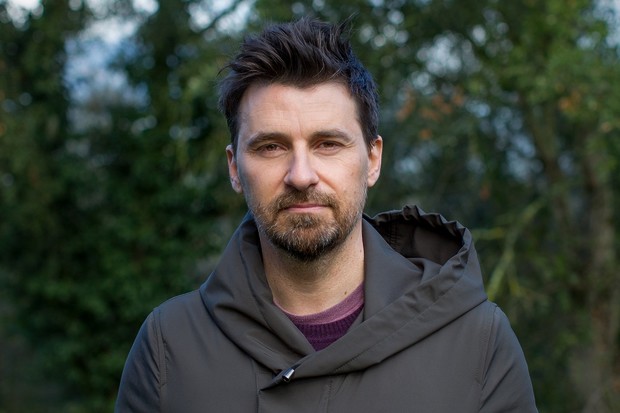BERLINALE 2018 Panorama / Tribeca 2018
Ramón Salazar • Director
“We tried not to make it give way to tear-jerking melodrama”
- BERLIN 2018: Ramón Salazar is back at the Berlinale with his fourth film, Sunday’s Illness, an intimate drama starring the incredible Susi Sánchez and Bárbara Lennie

Ramón Salazar (Málaga, 1973) is back at the Berlin Film Festival 16 years after competing in its official section with his feature debut, Stones. Now, with his fourth movie, Sunday’s Illness [+see also:
film review
trailer
interview: Ramón Salazar
film profile], starring the magnificent Susi Sánchez and Bárbara Lennie, he is doing so in the Panorama. We talked to him about cinema, silences and his two superlative actresses.
Cineuropa: How did you keep the tone of the film under control so that it wouldn’t descend into melodrama territory?
Ramón Salazar: That was one of the things I had clearest in my head right from the start, in terms of the concept for the film and what exactly I wanted to make: it was about two characters who are not saying or expressing what they really feel. That was the initial premise when it was time to start writing, and then I had to give the actresses guidelines for how to overcome the fact that their characters have not seen each other for 30 years: what do you talk about then? Well, about ridiculous things; they swing from one thing to the other, without being able to talk about any of the major issues that concern them. That was the blueprint for the story so that it wouldn’t give way to melodrama, which is where the plot could easily have ended up going. In fact, in the edit, we dropped things that could have tended towards mushiness or tear-jerker territory, and we also tried to stop the music from ever intensifying an emotional situation in a melodramatic way.
The camera moves very little, in contrast with your previous films…
Yes, there is minimal camera movement: when we were planning the movie, we decided that the camera should be left alone and that, unlike in 10.000 noches en ninguna parte [+see also:
film review
interview: Ramón Salazar
film profile], where the camera was in constant motion, it had to be still. Also, what was happening within the shot had to be what was discussed in the film, but without ever underlining anything: we did a stripping-back exercise so as not to give way to artifice or include any embellishments, even though we were tempted to do so.
Why did you decide to tackle the specific topics that you deal with in the film?
It was born of the desire to work with Susi Sánchez again after 10.000 noches… and to write a leading role for her. The mother-daughter relationship was the next thing, plus the desire for it to be a personal, intimate story, with virtually just two characters, with locations that would allow me to enjoy the process of working with the two lead actresses.
Does the title of the film come from a feeling of sadness that overwhelms you on that particular day of the week?
Yes; I thought that it only happened to me as a kid, but it turns out that more people suffered from it… It’s something pretty widespread, and I liked that a lot: realising that it was a much more common thing. As happens in a previous short of mine called El domingo, Bárbara Lennie’s character knows that she was abandoned by her mother on that day of the week: and that feeling of loss stays with her her whole life. Sometimes you sit down to write a story and you connect with something that you had completely forgotten – and, suddenly, you remember that exact same feeling and wonder if there could be something interesting there.
Did you rehearse with the actresses prior to the shoot?
Susi accompanied me throughout the process of writing the script, with meetings right from the first treatment: we spent two years building up the character, like a rehearsal from the very beginning. We’d planned a month-and-a-half of rehearsals with Bárbara, but when the two actresses arrived in Barcelona and we began poring over the text, I realised it would be better if we didn’t rehearse: they are so different as actresses and as people that the fact they didn’t know one another actually worked in the film’s favour. And I also liked the fact that they came together during the shooting process and not during rehearsals, so I separated them again and they didn’t meet again until we started principal photography. I also tried to work with secrets, so that the information that one actress had about her character was not in the possession of the other. It was best for there to be no chemistry between them, as they are unpleasant strangers, and one doesn’t know who the other one is.
You’d worked with Susi previously, even in Stones, where she had a minor role, but why did you go with Bárbara Lennie?
When we were doing the auditions, I thought she was the least suitable, as she is ten years younger than the character, according to how it was written. But she turned up, did the rehearsal and cleared off, and I knew straight away that it had to be her. She has a mind-boggling way of working, how she absorbs the information you give her, and then she invests all of that in her performance. I don’t know how she does it, but she just does it: she made me fall in love with her.
(Translated from Spanish)
Did you enjoy reading this article? Please subscribe to our newsletter to receive more stories like this directly in your inbox.
















